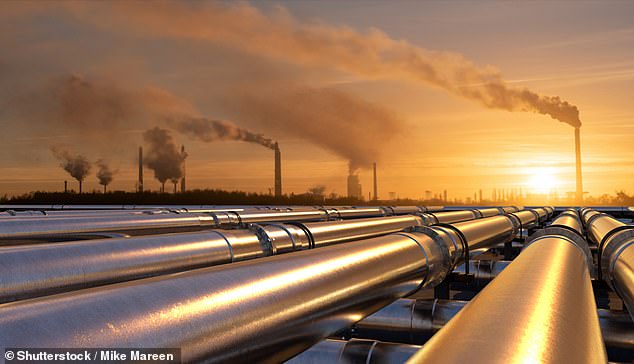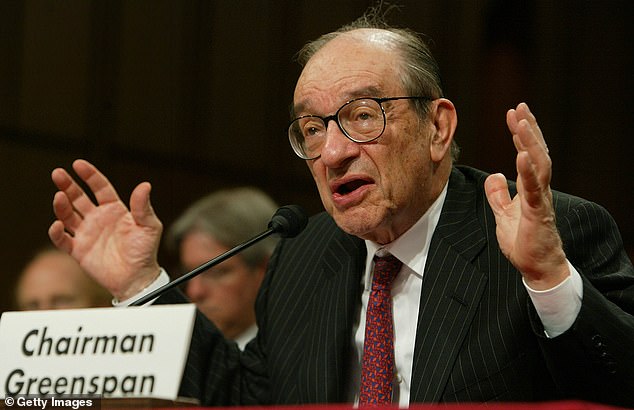Oil prices slump ahead of US Fed minutes with BP and Shell shares under pressure as investors await insight on interest rate outlook
- The US Federal Reserve has raised interest rates on seven successive occasions
- It is set to release the minutes from its December policy meeting on Wednesday
- Interest rate increases tend to cause oil prices to decline or slow their growth
Oil prices are trading lower amid heightened worries about the global economy and further interest rate hikes from the US Federal Reserve.
Brent Crude futures for March had slipped 2.4 per cent to $80.16 per barrel just before 11am, while West Texas Intermediate crude had declined by 2.3 per cent to $75.37 a barrel.
Both benchmarks are now more than $4 below their value at the equivalent point yesterday and much lower than during the summer of 2022, following Russia’s full-scale invasion of Ukraine.

Interest rate increases elevate the cost of borrowing while reducing spending on goods like petrol, thereby causing oil prices to decline or slowing their growth,
It comes ahead of the US Federal Reserve releasing the minutes from its most recent policy meeting in December, which is set to give an indication of how much the central bank will increase the Fed funds rate by in 2023.
The central bank has raised interest rates on seven successive occasions, putting it up by 50 basis points to 4.25 to 4.5 per cent at the last meeting after four consecutive 75 bps hikes.
While these measures have helped lower the US inflation rate to 7.1 per cent, it remains far above the 2 per cent target, meaning additional rate bumps are more than probable.
Interest rate increases elevate the cost of borrowing while reducing spending on goods such as petrol, thereby causing oil prices to decline or slowing their growth.
However, an increase in the cost of borrowing also weakens economic growth.
Alan Greenspan, a former long-serving Fed chairman, warned that a recession would be the ‘most likely outcome’ needed to reduce inflation in the US this year.
Speaking in a Q&A session on the website of Advisors Capital Management, where he is a senior economic advisor, Greenspan, 96, said more needed to be done to take the teeth out of price rises.

Prediction: Former US Federal Reserve chairman, Alan Greenspan (pictured), warned that a recession would be the ‘most likely outcome’ needed to reduce inflation in the US this year
‘Wage increases, and by extension employment, still need to soften further for a pullback in inflation to be anything more than transitory,’ he added.
‘So, we may have a brief period of calm on the inflation front, but I think it will be too little too late.’
His comments follow warnings by Kristalina Georgieva, the managing director of the International Monetary Fund, that one-third of the global economy would enter recession this year.
The Bulgarian-born economist said this would result from the US, European Union and Chinese economies ‘all slowing down simultaneously’.
In the past three years, China’s economy has been severely affected by draconian Covid-19 curbs, particularly in 2022, causing massive disruption in major cities and depressing consumer oil demand.
Consultancies based in the world’s second-largest economy reported on Tuesday that authorities had raised export quotas for refined oil products by almost half to 19 million tonnes.
Such a move could incentivise Chinese refiners to process more crude output and sell more to the EU, where bans on Russian crude are planned to come into effect on 5 February.
Meanwhile, Saudi Arabia signalled it could slash prices on its flagship Arab light crude going to Asia next month, having already cut them to their lowest in 10 months for shipments in January.
The commotion affecting oil markets sent shares in London-listed energy majors down in early trading.
BP, Harbour Energy and Shell all among the top ten fallers on the FTSE 100, although the index still rose modestly.
Russ Mould, the investment director of AJ Bell, said: ‘Investors are increasingly concerned about the current Covid situation in China where a relaxation of restrictions is leading to a surge in cases.
‘Thanks to less effective vaccines and a population with much less natural immunity, China is some way behind the West in its recovery from the pandemic, and this has implications for global growth and global supply chains.’
Advertisement


